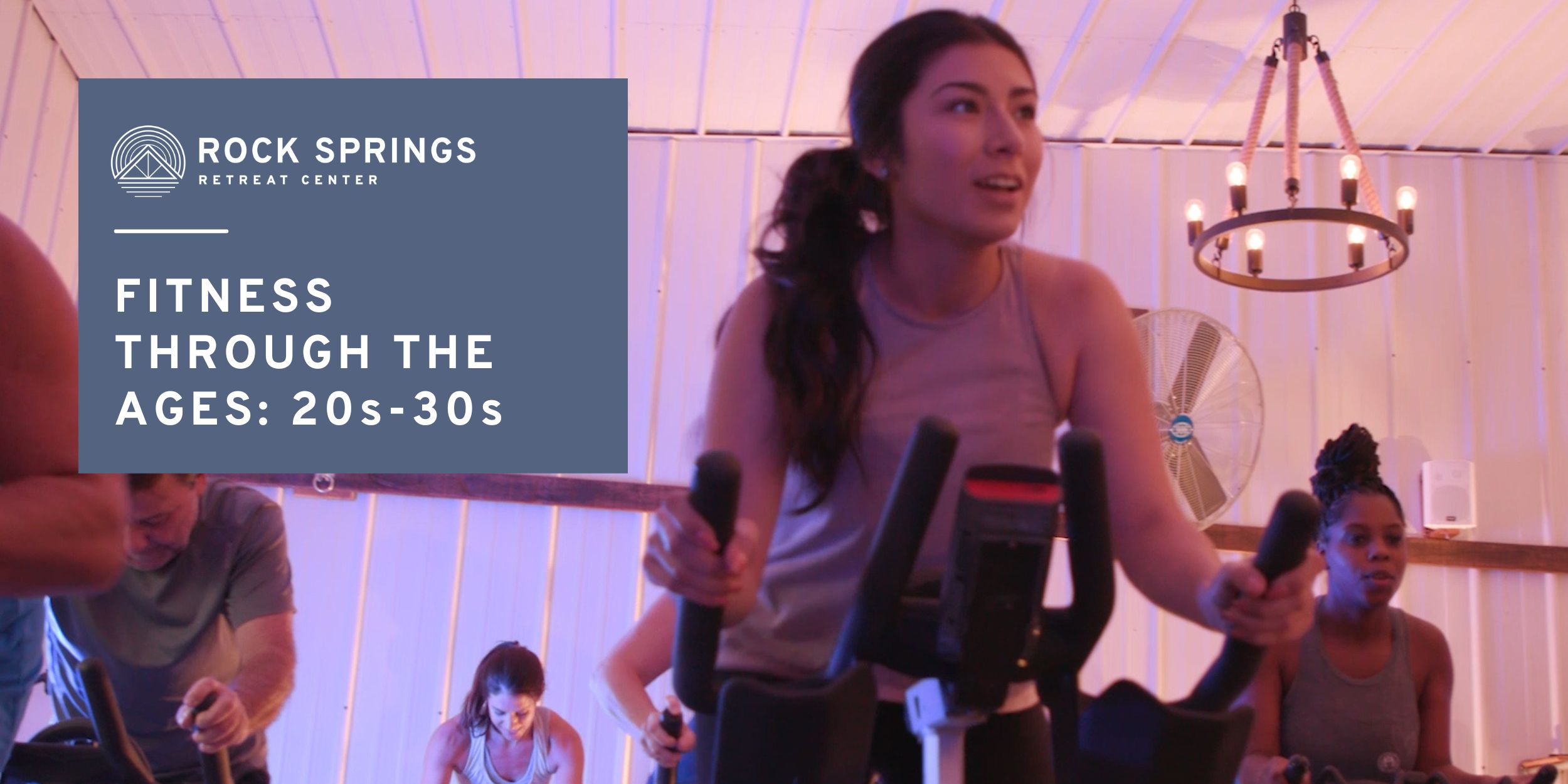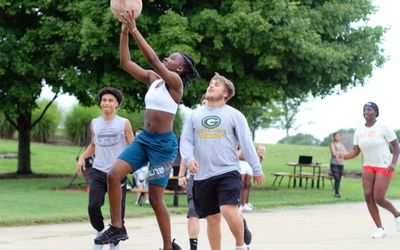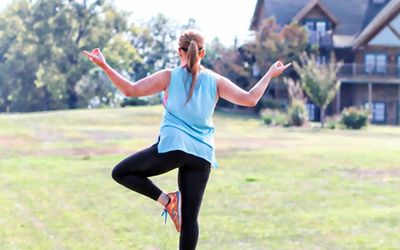
Rock Springs Retreat Center / September 27, 2022 /
Anna Rutherford /
0
A common misconception is when you’re in your 20s or even 30s, you don’t really need to exercise and can eat whatever you want because you’re young and therefore, healthy. The reality is that’s simply not true. In fact, this is a crucial time now more than ever to take care of your body. As you age and enter each new decade of your life, you will feel the effects of the decisions you make now. These two decades in your life are the perfect opportunity for you to take control of your health and set a strong foundation for years to come. So, what can you do to be proactive with your health and fitness in your 20s and 30s?
Create Healthy Eating Habits

When you have classes all day or have a long day at work, sometimes it’s just more convenient to go through the drive-thru of the nearest fast-food joint or skip a meal altogether. Maybe the latest fad diet suggests skipping meals is the way to go, but there’s a reason why fad diets come and go. Trust us when we say that proper nutrition is not something you want to forego. Having a healthy diet has tremendous benefits, and by eating properly and not skipping meals, you’ll be surprised to see these benefits in your waistline and beyond!
Healthy eating starts with balanced meals. With a proper balance of macro-nutrients, you’ll find yourself less tired, more focused, in a better mood, and just healthier in general. If time is the culprit for your unhealthy eating habits, block out a window in your schedule when you’re free and able to prep your meals for the week. Go to the grocery store prepared by having a list of what you need and don’t go on an empty stomach; you’ll be more likely to impulsively buy beyond what’s on your list. If you need help determining what your healthy options are when navigating a grocery store, you’ll find this article helpful.
Healthy eating starts with balanced meals. With a proper balance of macro-nutrients, you’ll find yourself less tired, more focused, in a better mood, and just healthier in general. If time is the culprit for your unhealthy eating habits, block out a window in your schedule when you’re free and able to prep your meals for the week. Go to the grocery store prepared by having a list of what you need and don’t go on an empty stomach; you’ll be more likely to impulsively buy beyond what’s on your list. If you need help determining what your healthy options are when navigating a grocery store, you’ll find this article helpful.
Have a Balanced Exercise Routine

Exercise can go both ways in your 20s and 30s. You can exercise too much or too little. Just like nutrition, the key here is balance. Blending both cardio and strength training will give you a jumpstart to a healthy lifestyle for decades to come. Cardio keeps your heart and lungs healthy while contributing to weight loss by burning calories. Strength training is arguably just as important. Beyond the obvious gains in muscular definition, maintaining a healthy strength training regime combats against muscle mass reduction which naturally happens as you age. We say healthy regime because, yes, there is such a thing as too much exercise even in your 20s and 30s.
Sure, you may want to outdo your buddy when it comes to lifting weights or you want to go all in an extreme exercise routine to lose a couple of pounds, but just because you’re young and CAN push your body that hard, doesn’t mean you SHOULD do it. No certified trainer or fitness program will have you non-stop working out without rest (at least they shouldn’t). Even our fitness retreats at Fit Farm include a balance of rest and work between rest periods throughout the day, evenings, and intentional rest days because it’s necessary.
A healthy balance of exercise needs to include ample time for your body to rest and recover so you can continue increasing your gains and avoid setbacks. Too much strength training and even cardio without proper rest can lead to decreased performance, burnout, and most importantly of all, injuries both short-term and long-term.
On the other side of the coin, little to no exercise is also bad. You may think exercise is something you can put on the back burner for now because you’re still young, but that couldn’t be any further from the truth. Instead of thinking of exercise as a remedy, think of it as a preventative. When you exercise regularly and take care of your body, especially when you're young and physically capable, you set yourself up for a healthy lifestyle in the long run. By building a good physical foundation, you slow the effects of aging, maintain a healthy weight easier, and reduce the risk of complications from diseases such as type 2 diabetes.
Sure, you may want to outdo your buddy when it comes to lifting weights or you want to go all in an extreme exercise routine to lose a couple of pounds, but just because you’re young and CAN push your body that hard, doesn’t mean you SHOULD do it. No certified trainer or fitness program will have you non-stop working out without rest (at least they shouldn’t). Even our fitness retreats at Fit Farm include a balance of rest and work between rest periods throughout the day, evenings, and intentional rest days because it’s necessary.
A healthy balance of exercise needs to include ample time for your body to rest and recover so you can continue increasing your gains and avoid setbacks. Too much strength training and even cardio without proper rest can lead to decreased performance, burnout, and most importantly of all, injuries both short-term and long-term.
On the other side of the coin, little to no exercise is also bad. You may think exercise is something you can put on the back burner for now because you’re still young, but that couldn’t be any further from the truth. Instead of thinking of exercise as a remedy, think of it as a preventative. When you exercise regularly and take care of your body, especially when you're young and physically capable, you set yourself up for a healthy lifestyle in the long run. By building a good physical foundation, you slow the effects of aging, maintain a healthy weight easier, and reduce the risk of complications from diseases such as type 2 diabetes.
Take care of your mental health

Exercise is amazing for your body both physically and mentally. We all know the physical benefits associated with exercise, like losing weight and getting “swole.” But what happens behind the scenes is just as important. When we exercise, endorphins, a hormone often referred to as a “feel-good” chemical, are released. These naturally reduce stress and help improve your overall mood. If you find you are often stressed and mentally exhausted, exercise can help! But perhaps the most difficult part of fitness in your 20s and 30s is not the physical activity itself but finding the time and motivation. Just like healthy eating, it can be difficult to squeeze in a workout every day. The good news is that if you have a busy schedule, there are ways you can get a quick workout in. Even if it’s just a little movement here and there, every little bit counts. The best thing you can do is dedicate time for exercise in your schedule, just like for your meal planning.
If you’re struggling with staying focused, constantly exhausted, and overwhelmed mentally, perhaps you may want to give a fitness retreat a try. The mental health benefits and the break from everyday life give you the reset you need for mind, body, and soul. You can learn more about giving your mind the vacation it deserves here.
If you’re struggling with staying focused, constantly exhausted, and overwhelmed mentally, perhaps you may want to give a fitness retreat a try. The mental health benefits and the break from everyday life give you the reset you need for mind, body, and soul. You can learn more about giving your mind the vacation it deserves here.
Let Sleep Be Your Best Friend

Perhaps one of the biggest factors contributing to our overall health is sleep. When our bodies don’t get enough sleep, it isn’t pretty. Staying up late partying, studying, working, or whatever else may keep us up, and then waking up before a full night’s rest negatively impacts our bodies. According to Cleveland Clinic, chronic sleep deprivation has serious consequences including high blood pressure, diabetes, heart attack, heart failure, or stroke. Not to mention it impairs your mental awareness which can affect your quality of work and potentially even put you or others in danger.
Often, energy drinks are relied on to give us a burst of energy and allow us to make it through the day. In fact, energy drinks are the most consumed dietary supplement by young adults next to multivitamins according to NIH. Unfortunately, these stimulants in excess have negative side effects that you may notice immediately upon consumption. Increased heart rate, heart palpitations, anxiety, and potentially serious heart and blood vessel problems in the long-term to name just a few. Caffeine is also linked with sleep problems and is a diuretic, so it shouldn’t be combined with exercise. Now, that doesn’t mean you shouldn’t have your daily cup of coffee. Just like all things, moderation is key. Instead of opting for an energy drink or an extra boost of caffeine to stay awake, take a look at your sleep pattern and adjust it. You may come to find you’re not giving your body enough time to recuperate.
Just like with healthy eating and exercising, it all boils down to time management. Remember when we mentioned adding rest days to your exercise routine? Sleep is not only part of that rest cycle by aiding in the repair of our muscles but sleep also allows our brain to reset and function healthily, regardless of our activity level. So, do yourself a favor and give your body 7-9 hours of well-earned sleep every day. You’ll quickly notice that you don’t need to rely on caffeine as much and will feel an immediate improvement in your quality of life.
Often, energy drinks are relied on to give us a burst of energy and allow us to make it through the day. In fact, energy drinks are the most consumed dietary supplement by young adults next to multivitamins according to NIH. Unfortunately, these stimulants in excess have negative side effects that you may notice immediately upon consumption. Increased heart rate, heart palpitations, anxiety, and potentially serious heart and blood vessel problems in the long-term to name just a few. Caffeine is also linked with sleep problems and is a diuretic, so it shouldn’t be combined with exercise. Now, that doesn’t mean you shouldn’t have your daily cup of coffee. Just like all things, moderation is key. Instead of opting for an energy drink or an extra boost of caffeine to stay awake, take a look at your sleep pattern and adjust it. You may come to find you’re not giving your body enough time to recuperate.
Just like with healthy eating and exercising, it all boils down to time management. Remember when we mentioned adding rest days to your exercise routine? Sleep is not only part of that rest cycle by aiding in the repair of our muscles but sleep also allows our brain to reset and function healthily, regardless of our activity level. So, do yourself a favor and give your body 7-9 hours of well-earned sleep every day. You’ll quickly notice that you don’t need to rely on caffeine as much and will feel an immediate improvement in your quality of life.
Your 20s and 30s are exciting decades in your life. You’ll experience many new things and major life events while becoming aware of who you are within. This youthful time period is the prime opportunity for you to proactively begin to set a healthy lifestyle in place. All you need is a consistent routine of healthy eating, exercise, and sleep. If you need help getting started on your journey, Fit Farm at Rock Springs is here to help! Our fitness retreats have helped many adults from the young age of 18 all the way to seniors 65+ of all fitness levels set a strong foundation of healthy habits. Contact our team to learn about how we can help you reap an entire lifetime of health benefits today.
call now
